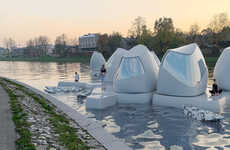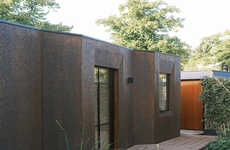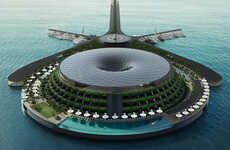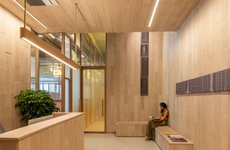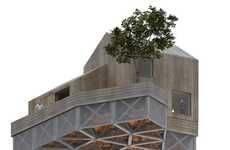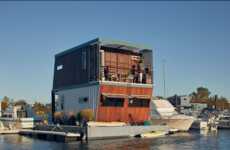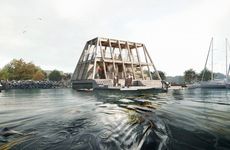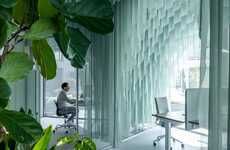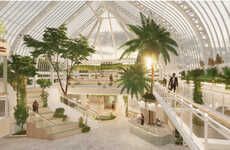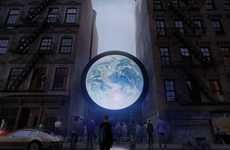
The Floating Office Rotterdam Can Survive Rising Sea Levels
Michael Hemsworth — August 22, 2022 — Eco
References: powerhouse-company & yankodesign
The Floating Office Rotterdam has been designed by Dutch architects Powerhouse Company as a different kind of office space that makes use of coastal space for efficiency.
The office is characterized by its circular design that sits right on the water and is even accented by a swimming section right on the side. The low-level building boasts a mix of materials to give it a modern yet comfortable feeling on both the interior and the exterior. The roof is equipped with a total of 870-square-meters of solar panels to generate more energy than the building actually uses; the remaining electricity is supplied back to the city.
The Floating Office Rotterdam maintains a climate-resilient design that would simply rise up rather than sink in the face of rising sea levels.
The office is characterized by its circular design that sits right on the water and is even accented by a swimming section right on the side. The low-level building boasts a mix of materials to give it a modern yet comfortable feeling on both the interior and the exterior. The roof is equipped with a total of 870-square-meters of solar panels to generate more energy than the building actually uses; the remaining electricity is supplied back to the city.
The Floating Office Rotterdam maintains a climate-resilient design that would simply rise up rather than sink in the face of rising sea levels.
Trend Themes
1. Circular Design Office Spaces - The use of circular design in office spaces, such as the Floating Office Rotterdam, could disrupt traditional office architecture and provide more sustainable options for coastal cities.
2. Climate-resilient Building Design - The rising concern over climate change and its effects on coastal cities could lead to a surge in demand for climate-resilient building designs, like the Floating Office Rotterdam.
3. Energy-efficient Architecture - The use of solar panels and other energy-saving materials in architecture, like the Floating Office Rotterdam, could lead to a shift towards more energy-efficient buildings in the future.
Industry Implications
1. Architecture - The architecture industry could capitalize on sustainable and climate-resilient designs for coastal offices and other coastal buildings.
2. Renewable Energy - The renewable energy industry could potentially provide more efficient and affordable energy solutions for office buildings in coastal areas looking to emulate the Floating Office Rotterdam's use of solar panels.
3. Real Estate - Real estate developers could potentially capitalize on the demand for innovative and sustainable office spaces, like the Floating Office Rotterdam, in coastal cities.
5.4
Score
Popularity
Activity
Freshness

